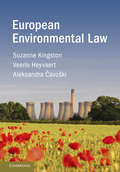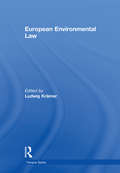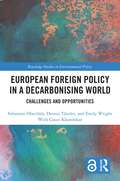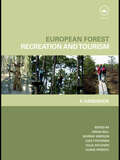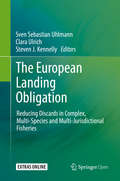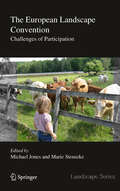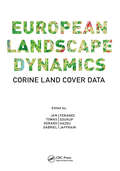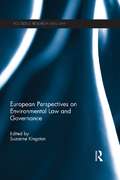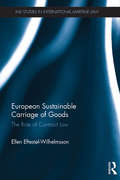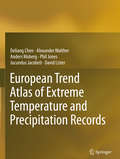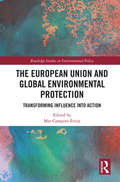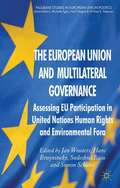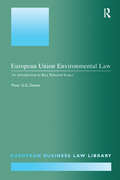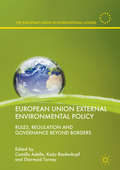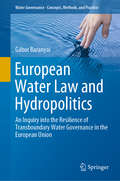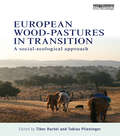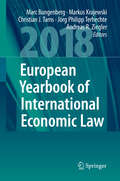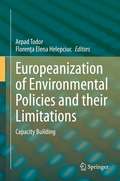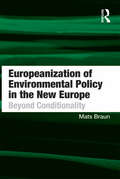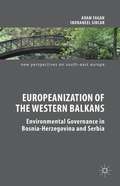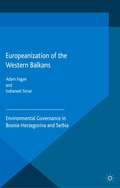- Table View
- List View
European Environmental Law (Routledge Research In European Union Law Ser.)
by Suzanne Kingston Veerle Heyvaert Aleksandra ČavoškiEU Environmental Law is a critical, comprehensive and engaging account of the essential and emerging issues in European environmental law and regulation today. Suitable for advanced undergraduate and postgraduate students, the book delivers a thematic and contextual treatment of the subject for those taking courses in environmental law, environmental studies, regulation and public policy, and government and international relations. Placing the key issues in context, EU Environmental Law takes an interdisciplinary and thematic approach to help students to better understand the implementation and enforcement of environmental law and policy across Europe. It offers an accessible overview, and links theory with practical applications that will allow students to contextualise the outcomes of legal rules and their impact on public and private behaviours. It provides a definitive account of the subject, examining traditional topics such as nature conservation law, waste law and water law, alongside increasingly important fields such as the law of climate change, environmental human rights law, and regulation of GMOs and nanotechnology.
European Environmental Law: A Comparative Perspective (Tempus Series)
by Ludwig KrämerEuropean Environmental Law pulls together the most significant material on the subject from legal and other periodicals to form an essential compendium for those wishing to study the role of law in protecting and conserving the environment. The studies are arranged in three sections which examine the Europeanisation of law and policy, analyse the application and enforcement of law and discuss the improvement of standards in Europe.
European Foreign Policy in a Decarbonising World: Challenges and Opportunities (Routledge Studies in Environmental Policy)
by Sebastian Oberthür Dennis Tänzler Emily Wright Gauri KhandekarContributing to the emerging literature on the geopolitical and foreign policy implications of decarbonisation and energy transition processes, this book sheds light on the future of the European Union’s external relations under decarbonisation. Under the Paris Agreement on climate change, adopted in 2015, governments committed to phasing out the emissions of carbon dioxide and other greenhouse gases over the coming decades. This book addresses the many questions around this process of decarbonisation through detailed analyses of EU external relations with six fossil-fuel exporting countries: Nigeria, Indonesia, Azerbaijan, Colombia, Qatar and Canada. The authors systematically examine the six countries’ varying dependence on fossil fuels, the broader political and security context, current relations with the EU and the potential for developing these toward decarbonisation. In doing so, they put forward a series of findings that should hold across varying circumstances and provide a steppingstone to enrich and inspire further research on foreign policy, external relations and international relations under decarbonisation. The book also makes an important contribution to understanding the external implications of the 2019 European Green Deal. This volume will be of great interest to students and scholars of European environmental and climate policy, climate diplomacy, energy policy, foreign policy and climate/energy geopolitics.
European Forest Recreation and Tourism: A Handbook
by Simon Bell Murray Simpson Liisa Tyrväinen Tuija Sievänen Ulrike PröbstlIn an increasingly urbanized world more and more people are turning to our forests and woodland for recreation and tourism. Planning and providing for this growing demand poses challenges that need to be addressed by managers and designers alike. Based on a study of forest recreation from across Europe, the editors bring together the expertise of more than eighty leading professionals and academics to provide a clear and concise guide to best practice. Case studies and careful research give a detailed insight into the issues that forest recreation raises, from strategic planning to integration into the existing rural economy. Essential reading for tourism planners, landscape designers and countryside managers delivering forest recreation and tourism.
The European Landing Obligation: Reducing Discards In Complex, Multi-species And Multi-jurisdictional Fisheries
by Sven Sebastian Uhlmann Clara Ulrich Steven J. KennellyThis open access book provides a comprehensive examination of the European Landing Obligation policy from many relevant perspectives. It includes evaluations of its impacts at economical, socio-cultural, ecological and institutional levels. It also discusses the feasibility and benefits of several potential mitigation strategies. The book was timely published, exactly at the time where the Landing Obligation was planned to be fully implemented. This book is of significant interest to all stakeholders involved, but also to the general public of Europe and to other jurisdictions throughout the world that are also searching for ways to deal with by-catch and discard issues.
The European Landing Obligation: Reducing Discards in Complex, Multi-Species and Multi-Jurisdictional Fisheries
by Sven Sebastian Uhlmann Clara Ulrich Steven J. KennellyThis open access book provides a comprehensive examination of the European Landing Obligation policy from many relevant perspectives. It includes evaluations of its impacts at economical, socio-cultural, ecological and institutional levels. It also discusses the feasibility and benefits of several potential mitigation strategies. The book was timely published, exactly at the time where the Landing Obligation was planned to be fully implemented. This book is of significant interest to all stakeholders involved, but also to the general public of Europe and to other jurisdictions throughout the world that are also searching for ways to deal with by-catch and discard issues.
The European Landscape Convention
by Marie Stenseke Michael JonesThis important and insightful book provides, for the first time, a broad presentation of ongoing research into public participation in landscape conservation, management and planning, following the 2000 European Landscape Convention which came into force in 2004. The book examines both the theory of participation and what lessons can be learnt from specific European examples. It explores in what manner and to what extent the provisions for participation in the European Landscape Convention have been followed up and implemented. It also presents and compares different experiences of participation in selected countries from northern, southern, eastern and western Europe, and provides a critical examination of public participation in practice. However, while the book's focus is necessarily on Europe, many of the conclusions drawn are of global relevance. The book provides a valuable reference for researchers and advanced students in landscape policies and management, as well as for professionals and others interested in land-use planning and environmental management.
European Landscape Dynamics: CORINE Land Cover Data
by Jan Tomas Gerard Gabriel Feranec Soukup Hazeu JaffrainFour unique pan-European CORINE Land Cover datasets—CLC1990, CLC2000, CLC2006, and CLC2012— and three datasets concerning changes between 1990 and 2012 have presented the first-ever opportunity to observe the European landscape by means of land cover and its change. This book brings together all these datasets to demonstrate the methods of identification, analysis and assessment of the European land cover and its changes that took place during the intervals of 1990–2000, 2000–2006, and 2006–2012. It provides examples in which CLC data plays a role in offering solutions to European environmental problems such as the monitoring of urban dynamics, land fragmentation, ecosystems mapping and assessment, and high nature value farmland characteristics. Existing environmental problems require new approaches, and European Landscape Dynamics: CORINE Land Cover Data indicates a set of outlooks for CLC data generation that produce more detailed levels of analysis and bottom-up approaches while addressing the relationship of CLC data to the Infrastructure for Spatial Information in Europe (INSPIRE). It also discusses the future of CLC data generation. A valuable resource of up-to-date information, it is useful to professionals such as scientists, territorial planners, and environmentalists as well as students of geosciences and all those who are interested in cognition of the European landscape, its changes and development.
European Perspectives on Environmental Law and Governance (Routledge Research in EU Law)
by Suzanne KingstonThis book provides a range of perspectives on some of the most pressing contemporary challenges in EU environmental law and governance from some of today’s leading European environmental academics and practitioners. The book maintains a focus on three key cross-cutting issues, each of which is carefully analysed through the lens of governance. The first theme to be addressed is that of climate change and the problems it poses for EU governance. The second issue explored concerns the challenge of integrating environmental considerations into other policy areas, as is required by the Treaty on the Functioning of the European Union and the EU’s Charter of Fundamental Rights. Finally, the third theme centres on the important challenge of improving environmental enforcement within the EU, and considers issues such as the Aarhus Convention and the evolution of the Commission’s work on implementation and enforcement throughout the past twenty years. Each of these three themes is situated within the broader ongoing debate about the changing nature of European environmental governance post-Lisbon and the ways in which developments in this area fits within broader trends in European governance theory and policy generally. European Perspectives on Environmental Law and Governance contains contributions from experts in the field including; Mary Robinson, Alan Boyle, Ludwig Kramer and Liam Cashman, and will be of interest to academics, students and practitioners of EU environmental law.
European Sustainable Carriage of Goods: The Role of Contract Law (IMLI Studies in International Maritime Law)
by Ellen Eftestøl-WilhelmssonThis work discusses the rapidly developing European transport policy on sustainable freight and the connected efforts initiated by the European Commission (EC) on greening transport by the means of contract law. Greening transport has been a central goal for the EU for decades. The main problem has been, and still is, that far too much carriage of goods within the EU is performed unimodally: by road carriage alone. This has caused severe problems particularly in central Europe, where both trade and environment is suffering from an ineffective transport industry with growing problems of congestion and pollution. A modal shift in transport from mainly road based to a form of transport in which more environmental friendly modes such as rail, inland waterways and sea born transport are integrated into one transport chain, is hence an objective of the EU. If successful, this model could then be extended to the international transport community. The key question raised in this book is whether the traditional role of contract law is changing to such an extent that the parties involved must take external interests into account. In the case of the EU’s efforts to enhance sustainable carriage of goods within its realm, the author explores whether governmental interference is necessary, or if we can trust that the parties will integrate environmental issues into their contracts because there is a demand for such clauses. The different proposals for an EU regime on multimodal contracts of carriage are discussed in this context. This book will be of great relevance to academics and practitioners with an interest in EU law, transport law, environmental law and maritime law in general.
European Trend Atlas of Extreme Temperature and Precipitation Records
by Deliang Chen Alexander Walther Anders Moberg Phil Jones Jucundus Jacobeit David ListerThis Atlas presents records of climatic variability and change in Europe starting before 1901 and focuses especially on trends of extreme temperatures and precipitation. The authors have used software developed within EMULATE (European and North Atlantic daily to MULtidecadal climATE variability) to obtain the extremes indices and temporal trends. The trend atlas provides an easy way to identify spatial patterns for a given time period, region, season, and index. The Atlas clearly shows that climate in Europe has changed over the last 100 to 150 years, such that the occurrence and intensity of warm temperature extremes have increased. Precipitation extremes have also changed, but with a less clear pattern compared to the temperature extremes.
The European Union and Global Environmental Protection: Transforming Influence into Action (Routledge Studies in Environmental Policy)
by Mar Campins EritjaThis book examines how the EU can be a more proactive actor in the promotion of the principles of sustainability and fairness from a legal environmental perspective. The book is one of the results of the research activity of the Jean Monnet Chair in EU Environmental Law (2017-2020) funded by the European Commission under the Erasmus+ programme. The European Union and Global Environmental Protection: Transforming Influence into Action begins with an introduction of the key EU competences, instruments and mechanisms, as well as the current international challenges at the EU level. It then explores case study examples from four regulated fields: climate change, biodiversity, multilateral trade, unregulated fishing, and access to justice; and four unregulated areas: mainstreaming of the Sustainable Development Goals in EU policies, and environmental justice, highlighting the extent to which the EU might align with international environmental regimes or extend its normative power. This volume will be of great relevance to students, scholars, and EU policy makers with an interest in international environmental law and policy.
The European Union and Multilateral Governance
by Jan Wouters Hans Bruyninckx Sudeshna Basu Simon SchunzAn interdisciplinary approach to the study of the EU in UN human rights and environmental governance which addresses the legal and political science dimensions. With contributions from academics and policy-makers, this volume is a comprehensive analysis of how the challenges it faces impact on the EU's position in UN fora.
European Union Environmental Law: An Introduction to Key Selected Issues (European Business Law Library #7)
by Peter G.G. DaviesThis comprehensive book provides analysis and discussion on the following key issues in EU environmental law: environmental competence, principles and objectives, implementation and enforcement, nature protection, impact assessment, trade and the environment, waste management, climate change and the EU. An accessible work for all students of the subject both academic or professional.
European Union External Environmental Policy
by Camilla Adelle Katja Biedenkopf Diarmuid TorneyThis book considers the environmental policies that the EU employs outside its borders. Using a systematic and coherent approach to cover a range of EU activities, environmental issues, and geographical areas, it charts the EU's attempts to shape environmental governance beyond its borders. Key questions addressed include: What environmental norms, rules and policies does the EU seek to promote outside its territory? What types of activities does the EU engage in to pursue these objectives? How successful is the EU in achieving its external environmental policy objectives? What factors explain the degree to which the EU attains its goals? The book will be of interest to students and academics as well as practitioners in governments (both inside and outside of the EU), the EU institutions, think tanks, and research institutes.
The European Union in International Climate Change Negotiations (Routledge Studies in Environmental Policy)
by Stavros AfionisThe EU has been portrayed as a leader in international climate change negotiations. Its role in the development of the climate change regime, as well as the adoption of novel policy instruments such as the EU Emissions Trading Scheme in 2005, are frequently put forward as indicative of a determination to push the international climate agenda forward. However, there are numerous instances where the EU has failed to achieve its climate change objectives (e.g. the 2009 Copenhagen Conference of the Parties). It is therefore important to examine the reasons behind these failures. This book explores in detail the involvement of the EU in international climate talks from the late 1980s to the present, focusing in particular on the negotiations leading up to Copenhagen. This conference witnessed the demise of the top-down approach in climate change policy and dealt a serious blow to the EU’s leadership ambitions. This book explores the extent to which negotiation theory could help with better comprehending the obstacles that prevented the EU from getting more out of the climate negotiation process. It is argued that looking at the role played by problematic strategic planning could prove highly instructive in light of the Paris Agreement. This broad historical perspective of the EU’s negotiations in international climate policy is an important resource to scholars of environmental and European politics, policy, law and governance.
European Water Law and Hydropolitics: An Inquiry into the Resilience of Transboundary Water Governance in the European Union (Water Governance - Concepts, Methods, and Practice)
by Gábor BaranyaiThis book provides the first comprehensive assessment of the various issues faced by countries in the European Union, where progressing climate change and urbanization pose significant cooperative challenges in a large number of river basins. Conducting a thorough analysis of the intricate web of EU water governance, it reveals that the hydropolitical stability of the European Union is already at risk. Further, given the structural nature of the shortcomings in EU water policy—e.g. the rigidity of the EU’s founding treaties or the institutional complacency of the European Commission—the book argues that these risks are likely to turn into sources of prolonged conflict, unless EU decision-making bodies take steps to address the new hydrological realities early on.
European Wood-pastures in Transition: A Social-ecological Approach
by Tibor Hartel Tobias PlieningerWood-pastures are important elements of European cultural identity and have an exceptional ecological value, yet they are in decline all over Europe. The structure of wood-pastures is strongly influenced by grazing and multiple other land uses and by local and regional environmental conditions. This book examines the diverse expressions of wood-pastures across Europe. It provides a new perspective, using a social-ecological framework to explore social and ecological values, governing institutions, threats and conservation approaches. It explores the major drivers of decline, which are shown to be related to accelerated cultural, institutional and developmental changes occurring across Europe over the past century. Case studies are included from North-Western, Southern, and Eastern Europe. Written by renowned scholars and conservationists, the book contributes to developing better, locally adapted conservation policies and management approaches for wood-pastures.
European Yearbook of International Economic Law 2018 (European Yearbook of International Economic Law #9)
by Markus Krajewski Jörg Philipp Terhechte Marc Bungenberg Andreas R. Ziegler Christian J. TamsVolume 9 of the EYIEL focusses on natural resources law understood as a special area of international economic law. In light of increasing conflicts over access to and the use of natural resources and of their impact on political, social and environmental aspects, the contributions of this volume analyse to which extent international economic law can contribute to the sustainable exploitation, management and distribution of natural resources. The volume collects contributions on general principles of natural resources law, the importance of natural resources for trade, investment and European economic law as well as analyses of particular sectors and areas including fracking, timber, space and deep seabed mining and natural resources in the arctic region.In its section on regional developments, EYIEL 9 addresses two regional integration systems which are usually not at the centre of public interest, but which deserve all the more attention due to their special relations with Europe: The Eurasian Economic Union and the Caribbean Community (CARICOM). Further EYIEL sections address recent WTO and investment case law as well as developments at the IMF. The volume also contains review essays of important recent books in international economic law and other aspects of international law which are connected to international economic relations.The chapter "Sovereignty, Ownership and Consent in Natural Resource Contracts: From Concepts to Practice" by Lorenzo Cotula is open access under a CC BY 4.0 license via link.springer.com.
Europeanization of Environmental Policies and their Limitations: Capacity Building
by Arpad Todor Florenţa Elena HelepciucThis book offers a window into the mechanisms that drive events when countries with poor track records in environmental protection and low administrative capacity, join an organisation with ambitious environmental regulatory regimes, which include some of the highest environmental protections standards in the world.This book examines the institutional building capacity in Romania after two decades of the development of the EU's environmental policy on elaboration, transposition, implementation, monitoring and institutional building. The book examines how Romania has fared as one of the least environmentally friendly EU member states, and poses the following questions. What are the limits of Europeanisation in the area of public policies? What is the reason why, despite the overwhelming public interest in environmental issues, and widespread agreement that urgent action to protect the environment and prevent catastrophic climate change are paramount, the pace of achieving the goals is remains slow. Why do policies fail?This book brings together several case studies focusing on the evolution of environmental policies in Romania over the last twenty years, with a special focus on the post-accession period (2007 onwards). The book provides an analysis of policies, where progress is less than satisfactory, and examines why this is the case.
Europeanization of Environmental Policy in the New Europe: Beyond Conditionality
by Mats BraunPrior to the European Union (EU) 2004/2007 enlargement there were several predictions that this event would hamper progressive decision-making within the EU on environmental policy. It was believed that the new member states had adopted EU rules as a consequence of the EU's conditionality and consequently they would rather slow down the reform speed in the field after accession. In this book, Mats Braun offers an up-to-date account of how post-communist member states have handled policy initiatives in the field of environmental policy after accession. Using detailed case studies of how Bulgaria, the Czech Republic, Poland and Romania dealt with two different EU policy initiatives - REACH and the Climate-Energy Package - he explores whether social norms and the process of socialization can help us understand why the track record of new member states in the area of environmental policy is more varied than was originally envisaged prior to enlargement.
Europeanization of the Western Balkans: Environmental Governance in Bosnia-Herzegovina and Serbia (New Perspectives on South-East Europe)
by Adam Fagan Indraneel SircarEuropeanization of the Western Balkans.
Europeanization of the Western Balkans: Environmental Governance in Bosnia-Herzegovina and Serbia (New Perspectives on South-East Europe)
by Adam Fagan Indraneel SircarThe book analyses the changing roles of international agencies, governmental bodies, non-governmental organisations, and local communities around major road-building environmental impact assessment processes in order to examine whether the influence of the European Union has transformed environmental governance in Bosnia-Herzegovina and in Serbia.
Europe's Steppe Frontier: 1500-1800
by William H. McneillIn Europe’s Steppe Frontier, acclaimed historian William H. McNeill analyzes the process whereby the thinly occupied grasslands of southeastern Europe were incorporated into the bodies-social of three great empires: the Ottoman, the Austrian, and the Russian. McNeill benefits from a New World detachment from the bitter nationality quarrels of the late nineteenth and early twentieth century which inspired but also blinded most of the historians of the region. Moreover, the unique institutional adjustments southeastern Europeans made to the frontier challenge cast indirect light upon the peculiarities of the North American frontier experience.
Evacuation Order
by Jane B. Mason Sarah Hines StephensIf you only had a few minutes to evacuate your house in the face of a wildfire, what would you take? And if you were separated from your mom and thought she was in danger, would you still leave - or would you head back in to rescue her?Twelve-year-old Sam lives alone with his mom and their dog in the idyllic seaside town of Santa Bonita. His father died when Sam was young, but his best friend Marco has been helping recreate his dad's old photos as part of a memorial project. One particularly warm October day, however, Sam smells something faint from far away. It's the scent of smoke.An unexpected southern California wildfire is whipping ferociously toward town. Sam, Marco, and the whole neighborhood must urgently evacuate with little warning. Sam is distraught. If his house burns, all his memories of his father will go with it.Even worse, Sam’s dog disappears during the emergency, sending the boy into a panic. When he should be leaving the city with Marco and his family, Sam instead turns back, a decision that will plunge him right into the path of a deadly fire.
